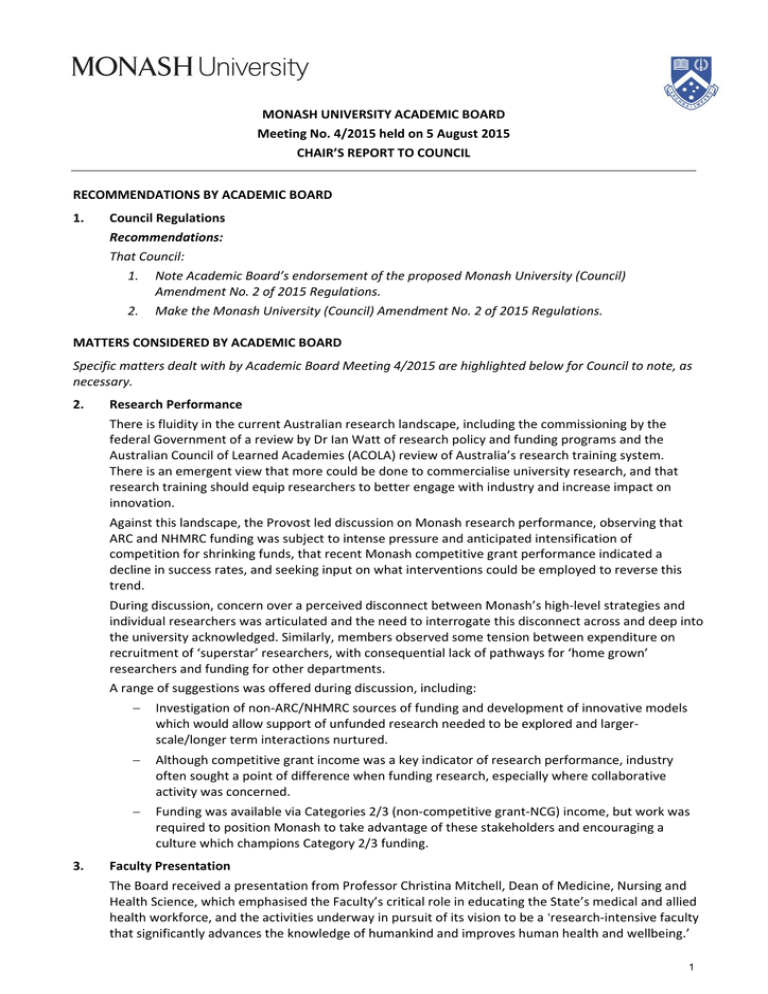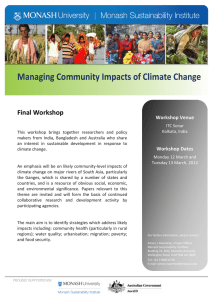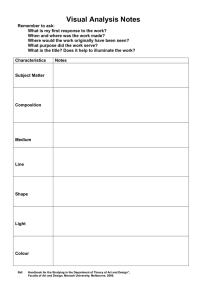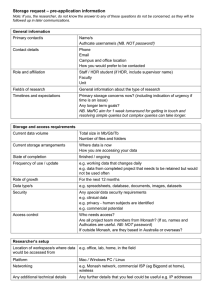MONASH UNIVERSITY ACADEMIC BOARD Meeting No. 4/2015 held on 5 August 2015 CHAIR’S REPORT TO COUNCIL
advertisement

MONASH UNIVERSITY ACADEMIC BOARD Meeting No. 4/2015 held on 5 August 2015 CHAIR’S REPORT TO COUNCIL RECOMMENDATIONS BY ACADEMIC BOARD 1. Council Regulations Recommendations: That Council: 1. Note Academic Board’s endorsement of the proposed Monash University (Council) Amendment No. 2 of 2015 Regulations. 2. Make the Monash University (Council) Amendment No. 2 of 2015 Regulations. MATTERS CONSIDERED BY ACADEMIC BOARD Specific matters dealt with by Academic Board Meeting 4/2015 are highlighted below for Council to note, as necessary. 2. 3. Research Performance There is fluidity in the current Australian research landscape, including the commissioning by the federal Government of a review by Dr Ian Watt of research policy and funding programs and the Australian Council of Learned Academies (ACOLA) review of Australia’s research training system. There is an emergent view that more could be done to commercialise university research, and that research training should equip researchers to better engage with industry and increase impact on innovation. Against this landscape, the Provost led discussion on Monash research performance, observing that ARC and NHMRC funding was subject to intense pressure and anticipated intensification of competition for shrinking funds, that recent Monash competitive grant performance indicated a decline in success rates, and seeking input on what interventions could be employed to reverse this trend. During discussion, concern over a perceived disconnect between Monash’s high‐level strategies and individual researchers was articulated and the need to interrogate this disconnect across and deep into the university acknowledged. Similarly, members observed some tension between expenditure on recruitment of ‘superstar’ researchers, with consequential lack of pathways for ‘home grown’ researchers and funding for other departments. A range of suggestions was offered during discussion, including: Investigation of non‐ARC/NHMRC sources of funding and development of innovative models which would allow support of unfunded research needed to be explored and larger‐ scale/longer term interactions nurtured. Although competitive grant income was a key indicator of research performance, industry often sought a point of difference when funding research, especially where collaborative activity was concerned. Funding was available via Categories 2/3 (non‐competitive grant‐NCG) income, but work was required to position Monash to take advantage of these stakeholders and encouraging a culture which champions Category 2/3 funding. Faculty Presentation The Board received a presentation from Professor Christina Mitchell, Dean of Medicine, Nursing and Health Science, which emphasised the Faculty’s critical role in educating the State’s medical and allied health workforce, and the activities underway in pursuit of its vision to be a ‘research‐intensive faculty that significantly advances the knowledge of humankind and improves human health and wellbeing.’ 1 In the Education space, Professor Mitchell described the implementation of a number of initiatives designed to improve professional learning, adoption of innovative and interactive learning tools and commended the Faculty’s ability to deliver programs to an increased student load with decreased academic and professional staff numbers and the increased focus on recruitment and retention of Indigenous students. However, there were a number of current and anticipated challenges, including growing competition for and costs of clinical placements, poor teaching infrastructure, and need to upskill in the online learning space. Professor Mitchell explained that the Faculty had developed and was implementing a number of strategies to enable it to cope with increased demand, including the growth in international student numbers. In the Research space, members noted that in 2014 the Faculty had achieved its highest total for annual research income ($166M), ranking first in the country in NHMRC Project Grants and Fellowships. However, there were enormous challenges imminent, likely to result in significantly reduced revenue, requiring the faculty to develop strategies to maximise funding. Professor Mitchell highlighted the establishment of new institutes, including the Monash Institute of Cognitive and Clinical Neuroscience (which had recently attracted Monash’s largest single philanthropic donation) and development of key enterprising partnerships, including the Victorian Heart Hospital and large scale tenders and clinical trials. 4. Quality and Standards There are a number of measures by which the Board assures itself of the quality of Monash’s academic endeavours. These include development and implementation of appropriate assessment measures and monitoring of annual Academic Progress Committee (APC) data. Academic Board considered a number of amendments to assessment‐related policies, including the Assessment in Coursework Units Policy and Unit Guide Policy which incorporate elements of the Monash Assessment Vision and reflect updated roles and responsibilities in the case of the former, and in the case of the latter, to incorporate a significant change requiring that ‘every student enrolled in a unit must have access to the Unit Guide, in electronic or printed form, by the end of the orientation week of a standard semester, before the start of week one for units taught in block mode or, for all other teaching periods, not later than by the end of the first week’. The Board also noted approval by Learning and Teaching Committee (LTC) of associated Procedures, and the development of Staff Assessment FAQs which will assist staff in better understanding their obligations and provide examples of good practice in the assessment space. Further pieces of work, including a comprehensive review of the Board of Examiners Guidelines, are expected to be considered later in the year. Academic Board also considered an analysis of risk factors for engaging with the APC process, as indicated by a number of demographic and descriptive factors ‐ an enhanced form of reporting unsatisfactory academic progress data, generated by the Board’s 2014 referral to LTC of consideration of the nature of data generated in the APC report, and consequential mechanisms that could be used to enhance student performance at Monash University. The Board noted that extracting data is feasible, and that these can be combined with qualitative data from faculties to design intervention strategies to assist the academic progress of students. The Board directed that future reports include similar risk analyses and recommendations for interventions and it noted that allocation of responsibility for and adequate resourcing of the process providing enhanced data reporting was yet to be determined. Professor Ben Canny Chair, Academic Board 2



